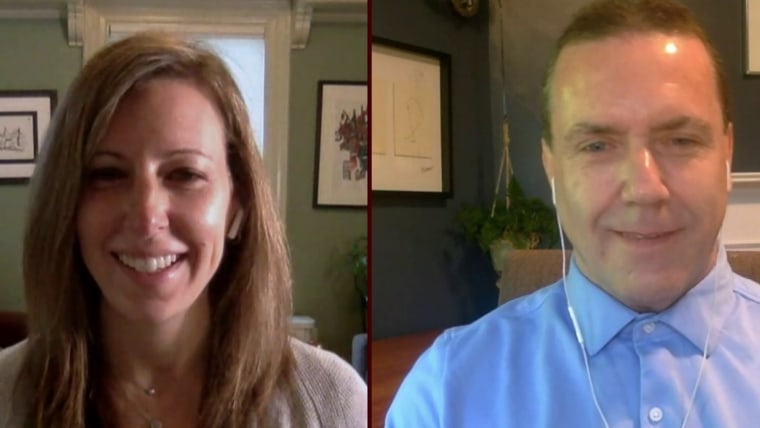More than 265 million vaccine doses have been administered in the U.S., which means most employers are starting to formalize reopening plans. However, Americans will be emerging from this catastrophe to face a parallel pandemic: a worsening mental health crisis.
The mental impacts of the pandemic will not be erased overnight with the vaccine ― and in fact may be exacerbated by a return to “normalcy.” As employers prepare for a return to the office, how can they support a workforce that is largely still coping with anxiety, fear, pain, and grief?
Here’s are some strategies employers should keep in mind:
Remember: Your post-pandemic workforce is not the same one that left.
Whenever people undergo a traumatic situation ― such as the pandemic of the past 13 months ― they are often unable to reflect on it in the moment. We go into autopilot to cope with the situation and tell ourselves things like: “it’s OK that I missed my grandchild’s birth,” “it’s alright that I postponed my wedding,” or “it’s normal that I’m lonely.” As people return to the office, this repressed trauma can make itself apparent as anxiety, exhaustion and depression.
To make matters more complicated, employees who suffered from Covid-19 may be experiencing neurological or mental disorders that can impact focus and productivity levels during the workday.
Employers need to understand these complex dynamics as they prepare to welcome back their workforce.
Give employees control over how ― and when ― they re-enter.
The pandemic took away our sense of control in many ways. As enterprises plan to reopen, they need to do so in a way that doesn’t undercut employee autonomy.
Microsoft, for example, is taking a staged approach to re-entry, in which it determines an office’s level of “openness” according to the health conditions in a given geography. The company reopened its Redmond, Washington campus after determining they could safely accommodate employees onsite — but the company did not immediately force employees on campus. Instead, Microsoft gave employees the choice to either return to the office, continue working remotely, or do both.
To the extent that it is possible, try to avoid mandating employees to return to the office until they have had opportunity to start small and build from successes. Ease employees back into office life without asking them to push too far out of their comfort zone too quickly. For example, with warm weather coming, consider holding a work function outdoors, or stagger the schedule of those working in the office. Give your employees the freedom to say, “I’m not ready yet,” and you will find that when they are ready, they will be more committed to their return.
Create a dialogue around mental health.
Offer multiple avenues that are accessible to employees – whether it is a lunch-and-learn or circulating resources and tips via weekly email. Make the mental health conversation routine, such as incorporating a reminder of resources at the top of a meeting agenda or encouraging a mindfulness activity prior to a brainstorm. At the same time, it’s important to understand that mental health is personal. Employers need to be open and create dialogue, while also providing external offerings (sponsored meditation apps, counseling and therapy, etc.) that empower employees to get the support they need in a private setting.
Commit to balance and model behavior.
High rates of burnout and negative mental health impacts were reported among people working remotely during the pandemic, with nearly half of adults saying they experienced stress, anxiety or depression. One of the benefits of the return to a more traditional office setting is the ability to set physical boundaries between personal and professional life ― but this can only happen if executives and managers model the appropriate behavior.
With a return to the office comes the opportunity to enforce clear out-of-office hours. If you need to send an after-hours email, use the “schedule send” feature to arrive in inboxes during business hours. Consider mandating time off or requiring a certain amount of personal time as part of performance reviews. Making such small adjustments can help enforce a more balanced approach to work and mitigate burnout.
Offering services such as meditation apps or therapy as part of a benefits program also gives employees the external tools they need to practice a more balanced lifestyle. To increase adoption, have managers model effective mental health strategies by reminding employees of these benefits and making it “ok” for employees to take time during the workday to step away and meditate.
Operate with kindness
Many will reflect on life post-pandemic and wish they had done something different – whether that is being more productive at work or dedicating more time to family. Pay attention to these dynamics and respond with kindness, reminding employees that we all did the best we could.
By operating with kindness, employers can empower and support their workforce. Explore mentorships or professional development opportunities that promote growth and assist employees with getting back on track to where they want to be. Make performance reviews reflective of this compassion, and don’t hold productivity to the same, pre-pandemic standards.
The silver lining is that the pandemic has pushed the mental health conversation to the forefront. It is imperative that we continue to be kind to ourselves and to each other; to give ourselves (and our employees) some grace, offering patience, flexibility and a willingness to have an open line of communication during this process.
Dr. Rachel O’Neill is an Ohio-Licensed Professional Clinical Counselor with Supervisory Endorsement. She is a therapist for Talkspace, Core Faculty in the graduate clinical mental health counseling program and co-owner a mental health consultation company that offers professional development workshops, on-site consultation services and program development resources to local mental health agencies. She has over 20 years of experience in the mental health profession.
"entry" - Google News
May 14, 2021 at 11:18PM
https://ift.tt/3tR8QlD
Employers: Here's how to do re-entry right if you want to ease anxiety, support mental health - NBC News
"entry" - Google News
https://ift.tt/3f5ZAUJ
https://ift.tt/3d6LMHD
Bagikan Berita Ini
















0 Response to "Employers: Here's how to do re-entry right if you want to ease anxiety, support mental health - NBC News"
Post a Comment